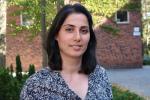
Sara Zahedi
- Born inIran, Islamic Republic of
- Studied inSweden
- Lives inSweden
Interview
Sara Zahedi is Assistant Professor in Numerical Analysis at KTH Royal Institute of Technology in Stockholm. She earned a doctorate at KTH in 2011 and has been a post-doctoral fellow in Uppsala. She was one of the ten winners of the European Mathematical Society Prize for 2016 for research regarding the development and analysis of numerical algorithms for partial differential equations on moving domains.
How would you explain your research to a non-specialist? Which are your favourite results up to now?
My research concerns the development of accurate and efficient computational techniques for computer simulations of immiscible fluids. In such simulations, the main challenge is that partial differential equations need to be solved in/on domains that are evolving with time and may undergo strong deformations. These partial differential equations may also have discontinuous parameters and solutions. We have for example developed and analyzed a computational method for accurately computing the fluid velocity which may have a discontinuous gradient and the pressure field which may be discontinuous across the interface separating two immiscible fluids without the need of conforming the mesh to the moving domains.
Can you tell us about the applications of your research?
Accurate computer simulations can improve our understanding and for example help in the design of microfluidic devices in which fluids are manipulated and controlled in miniature channels. An example of such a device is a Lab-on-a-chip, a credit card sized device, which can perform lab processes, for example, detect viruses or bacterias instantaneously.
You studied in Sweden, where your family moved from Iran: can you tell us something about your story? When have you decided to be a mathematician and why?
I came to Sweden as a child without my parents, I didn’t know anyone and I didn’t know any Swedish. In the beginning, most of the classes in school were difficult for me to follow but I could follow the math classes. It was also easier for me to communicate with other students in the math classes so math became my favorite subject early. My interest and my teacher’s encouragement made me choose to become a mathematician.
Has anyone supported you in your choice and during your career? You remember any obstacles?
My husband and my mother has supported me a lot. My high school teacher in math and physics, Maj Bodin inspired me, she told me at that time that I would either become a mathematician or physicist. When I started at the University several of my teachers encouraged me in my studies, in particular Prof. Boris Shapiro. My PhD advisor Prof. Gunilla Kreiss introduced me to the world of computational methods for multiphase flow problems. In the last five years Prof. Mats Larson has been as a mentor for me.
The long time of uncertainty of getting a permanent position in academia, the requirement to do postdocs often several at different places, with advantage abroad, creates obstacles which become quite challenging when you have a family and children.
Which are your passions, apart from mathematics?
My children are my passions. I spend most of my time with them.
You were the only woman awarded a prize at the European Congress of Mathematics in 2016 (out of 12): which is your point of view on issues about women in maths?
There are many excellent women in math but it is also the matter of seeing them, supporting them early in their career and giving them the opportunities they deserve.
Do you have a dream?
I dream about a future were at least 6 of 12 prizes are awarded to women 🙂 I also dream that I one day can see a democratic Iran ruled by the people for the people. That is what the people of Iran deserve.
